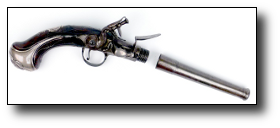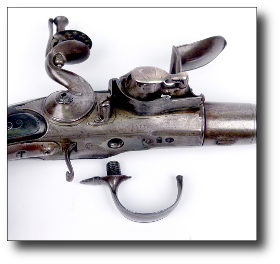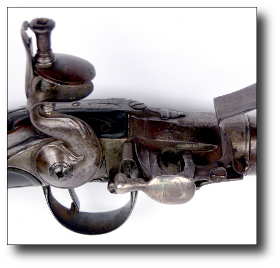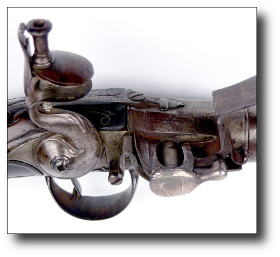Pair of Superimposed
(Two-Shot)
Queen Anne Flintlock Pistols
By Charles Pickfatt Circa 1740
In an era when breach loaders were
rare, a two-shot breach loader was
extraordinary. These Superimposed
Queen Anne Pistols use two
simultaneous loads of black powder
and a ball, one on top of the other
in the same barrel. Each load has a
corresponding
touch hole allowing it to be
individually ignited. The first ball
loaded acts as a seal to prevent
the second load from igniting the
first when fired.
|
|
Loading & Firing
To load one of the pistols
unscrew the barrel and insert
the first ball. Then add powder
followed by the second ball.
Screw the barrel back on. But
wait you say, there is no black
powder behind the first ball.
Right!
|

|

|
Unscrewing the trigger
guard reveals an opening
to the empty chamber
behind the first ball.
Add some black powder and
screw the trigger guard
back on.
|
|
Pull the hammer back to
half-cock the
pistol. The
flash pan has a
silver knob that
rotates a cylinder.
Turning the knob to the
left reveals a chamber
with its own touch
hole. This touch hole
leads to the powder
behind the first ball
that was loaded into
the barrel. Fill this
chamber with priming
powder and turn the
knob all the way to the
right.
|

|
|

|
The cylinder rotates and
the flash pan is empty
again. The primer and
touch hole for the first
ball is now safely
hidden. A second hole in
the top of the flash pan
leads to the powder
behind the second ball
loaded. Fill the flash
pan with priming powder
and close the
frizzen.
|
|
|
Now we are ready to fire. Full
cock the pistol, take aim and
fire. Half-cock the pistol and
rotate the flash pan knob fully
to the left. Close the frizzen.
Full cock the pistol, take aim
and fire. If you did everything
right you just fired two shots
without reloading. If not you
may be on your way to the
hospital or something
worse.
|
|
Description
Superimposed Queen Anne Pistols
like these are very rare. The
barrels resemble cannons and
have unscrewing lugs. The
walnut stocks have inlaid
silver wire with relief
carvings around the barrel
tang, silver escutcheon and
silver side plate. The silver
Ball and Cheek butt cap has a
detachable Grotesque Mask. a
silver knob on the flash pan
rotates to slelect the proper
touch hole. "PICKFATT" is
engraved on the side of the
breech below the feather
(frizzen) spring. Three proof
marks are stamped on bottom of
breech. Two are oval shaped, a
Crown over a "GP" (the
gun-makers proof) and a Crown
over a "V" (the "view mark").
The third is Charles Pickfatt`s
maker`s mark, "CP".
|
|
Overview
|
|
Type:
|
Belt Pistol
|
|
Style:
|
Superimposed Queen Anne
|
|
Country:
|
England
|
|
Overall Length:
|
13 1/2 inches
|
|
Barrel Length:
|
5 15/16 inches
|
|
Weight:
|
1 lb, 13 oz
|
|
Bore:
|
0.62 inches, Smooth
|
|
Stock:
|
Walnut, Ball & Cheek
Style
|
|
|
|
Charles Pickfatt
Charles Pickfatt`s father, Humphrey
Pickfatt Jr. was admitted as a
freeman of the Gunmakers` Company in
1688 and was elected Master of the
Company in 1706. He was issued
contracts by the Board of Ordnance
from 1689 to 1721 (3). The East
India Company, Hudson`s Bay Company
(1) and
Royal African Company all placed
orders with Pickfatt.
Charles Pickfatt was born in 1696
and baptized on May 10 at St.
Andrew, Holborn (2). The
church is located in the
northwestern edge of the City of
London. In 1719 Charles was made
a freeman of the Gunmakers`
Company by patrimony (property
inherited from one`s father or
male ancestor). The Board of
Ordnance issued contracts in his
name beginning in 1727 until he
retired in 1757 (3).
|
References
(1)
Gunmakers to the Hudson`s Bay
Company, by Gooding, S. James,
pages 19 to 21
Arms Collecting
Vol. 11, No. 1 (Feb. 1973),
Museum Restoration Service,
Bloomfield, Ontario
(2) London
Metropolitan Archives, St Andrew
Holborn, Register of baptisms,
1693 - 1704,
P82/AND2/A/001/MS06667, Item
006
UK National
Archives
(3) British
Board of Ordnance Contractors
1689-1840 by D.W. Bailey
Museum
Restoration Service, Bloomfield,
Ontario
|
|
|